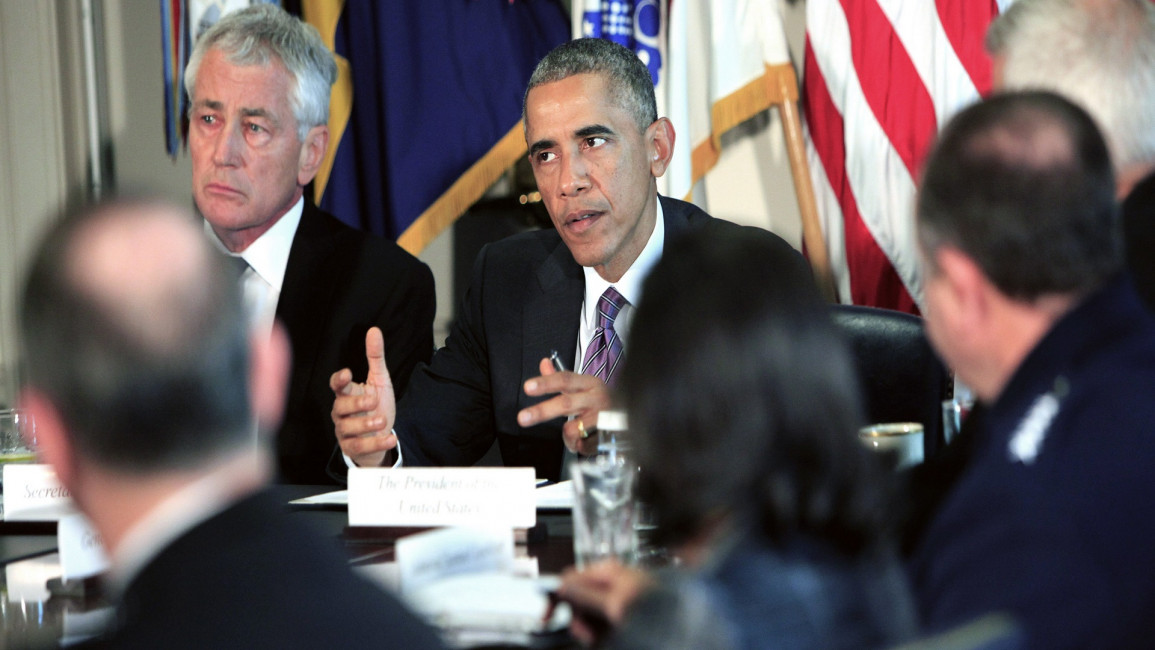
The Obama administration’s policy adrift in the Arab world
This year’s thanksgiving holiday coincides with significant developments in the US and a shock to its external security policy making institutions, which has only further confused the Obama administration in its dealings with existing crises in the Middle East.
The decision of the grand jury in Ferguson, which refused to indict police officer Darren Wilson, who shot and killed a black American teenager, Michael Brown, proves the racial issue is still a hot issue in US politics. The fact that angry protests quickly spread to other major US cities is proof of this. President Barrack Obama quickly addressed the American people, asking them to remain calm and exercise self-restraint and protest peacefully.
The growing rift within the administration
| The tension in the administration goes beyond the dispute over priorities in Syria, it is about the Obama's approach to foreign policy. |
This coincided with the resignation of Secretary of Defence Chuck Hagel, or rather his indirect dismissal, which revealed the depth of the deep rift within the Obama administration on national and international security. This caused rising tension between the Pentagon and the President’s national security advisors in the White House.
This was most apparent in the relationship between the President’s advisor, Susan Rice, and Secretary Hagel over the management of the crisis in the Middle East and the administration’s priorities, particularly in Syria. Hagel believed that the President’s strategy in fighting the Islamic State group (IS, formerly known as ISIS) must include the Syrian regime, which the White House refused. That key difference of opinion resulted in the resignation/dismissal.
The tension within the administration goes beyond the dispute over priorities in Syria, it is in fact related to the President’s approach to foreign policy. Hesitation and retreat have marked the administration’s decision-making process on sensitive issues in Syria and Iraq, which in turn led to the exacerbation of these crises to the extent that they now seem unresolvable.
Iraq still an unresolved problem
The situation in Iraq today could be responsible for a significant rift within the administration. The situation developed over years under Nouri al-Maliki’s leadership. Maliki enjoyed Washington’s support for reasons related to US policy in the region, but domestically his policies led to the alienation of key elements of Iraqi society and their exclusion from effectively participation in the process of governing the country. This paved the way for the IS to establish itself as a major actor on the Iraqi stage. Washington’s return to Iraq on a strategic basis remains contingent, dependent on various factors. This is in addition to the fact that there are other obstacles that threaten the plan to confront the IS.
The political crisis in Iraq tops that list, as it has not been addressed in a way that ensures the internal cohesion required to guarantee the measures taken against the IS will be effective, that they will stop the IS’s advance and retake the territories it has won in battle.
As the Americans themselves have said, without the establishment of the long-discussed tripartite coalition consisting of the Iraqi forces, the Peshmerga and the tribes, the US’s air campaign against the IS will not get the job done alone. This is in addition to the obstacles posed by corruption within the Iraqi military. This is being tackled by Prime Minister Haider al-Abadi, who dismissed 36 officers a few days ago. The same uncertainty clouds the administration’s policy in Syria, and this is why the administration’s policy in Syria is at an impasse.
An Arab role?
| Without support from Iraqi forces, the Peshmerga and the tribes, the US air campaign against the IS will not get the job done by itself. |
In the face of these complications, which involve serious risks for the Arab region as a whole, one must ask about the Arab role in confronting these challenges, from Libya, through Yemen and Iraq and Syria. This is in addition to Lebanon and Jordan, which continue to bear a refugee burden that surpasses their capacity to endure such a burden. It is true there has been a limited, indeed insufficient, Arab contribution to confronting terrorism in Iraq and Syria. One must ask the question where is Egypt’s central, pivotal and historic role, at least in Libya and Yemen? Has the Camp David peace treaty with Israel handcuffed Egypt and prevented it from performing an active and corrective role in the region?
The Obama administration faces new complications. During the last two years, the focus has been on upcoming elections. President Obama seeks to leave behind a distinguished legacy, especially in his health care law and on the disputed issue of immigration, which he has dealt with even if only temporarily with an executive decision after Congress blocked a decision on the issue for years. In spite of objections from the conservatives, the public welcomed the decision. He has also taken concrete steps on the issue of global warming, reaching an unprecedented agreement with China. As for foreign policy, he is betting on the battle with terrorism and the IS, although it remains to be seen if this battle can be won.
Perhaps during the thanksgiving holiday the Obama administration will find some of the inspiration it needs to read its foreign policy compass, particularly in the Arab world, which is also trying to find itself.
Opinions expressed in this article remain those of the original author and do not necessarily reflect the opinions of al-Araby al-Jadeed, its editorial board or staff.
This is an edited translation from our Arabic website.




